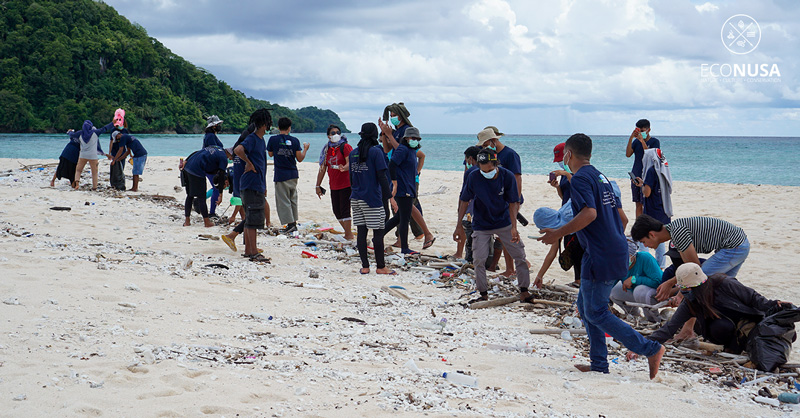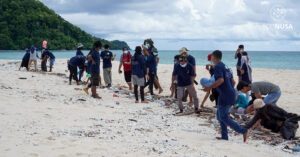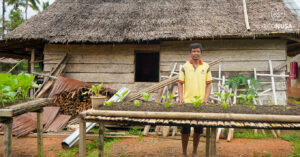
Plastic has seemingly become an inevitable basic needs to every person around the world. But the question is whether or not plastic has been sensibly used by every person here? Plastic waste is one of the largest pollutants in the world. It implies that most plastic waste is not well managed and in vain without proper recycling. This might become a time bomb jeopardizing human and nature anytime.
Citing J. Jambeck’s study, Indonesia is the second largest producer of plastic in the world after Tiongkok. This is due to the community’s poor plastic waste management and high production of single-used plastic. Ironically, Indonesia and China are the largest plastic product users and plastic waste producers.
Riset J Jambeck describes that in the United States of America, the use of plastic product or plastic packaging is 38 million kilograms per day at average. Albeit, the country successfully manages plastics so that the mismanaged plastic waste is very low. It is unlike China and Indonesia. As the first and second largest country of plastic waste in the world, the use of plastic in both countries is lower than that of the United States of America. The use of plastic in Tiongkok is 32 million kilograms per day. Unfortunately, the mismanaged plastic waste in this country is 24 million kilograms per day. In Indonesia, the amount of mismanaged plastic waste is 9 million kilograms per day despite the use of 11 million kilograms of plastic per day.
Based on the Sustainable Waste Indonesia (SWI) data, production of plastic waste in Indonesia is 5.6 million tons per year. However, the recycled plastic waste is less than 10 percent. More than 50 percent of plastic waste ends up on the final disposal sites (TPA). If continued, the final disposal sites will be over capacity.
The poor waste management in Indonesia leads the plastic waste to end up in the ocean and pollute ocean ecosystem. According to Ministry of Environment and Forestry (MoEF), 80 percent of ocean debris comes from land waste. It means that marine debris is likely derived from unrecycled waste.
The unrecycled waste problems, particularly concerning with plastic waste, will bring about significant effect to ecology. The challenge triggers climate change due to air pollution from horrible smell arising from the piled waste or burned debris. Besides, this will affect sea ecosystem due to the plastic waste in the ocean which creates nutrient-like smell to sea fauna. If the polluted sea fauna is consumed by human, microplastic (the very small part of plastic) in the sea animal could put human at risk as the next impact.
According to Dian Kurniawati, a resource person from Salam Academy and Tridi Oasis CEO, public mindset should be transformed from linear to circular economy to cut down waste production. “In such a current linear economy, waste keeps in growing noting the fact that it only takes from natural resources which are then manufactured into a product then it is only for single use purpose. This will affect the environment and human will lack natural resources,” she said on the Virtual Learning of EcoYouth School of Eco Diplomacy entitled “Transform Waste to Grace” on 17 April 2021.
Applying circular economy mindset will reduce production of waste and preserve the natural resources. “We take natural resources appropriately to create a product. After use, we recycle it into a new product. So, we will take no more new resources,” Dian said.
Similarly, Magafira Ali, the chairman of Cahaya Samudera Indonesia Foundation, elaborated that public mindset needs to be changed as waste can be transformed into something with economic value if properly managed. “Community considers that waste can only be disposed or burned. But for us, plastic waste could be transformed into fuel or kerosene if it is managed properly,” said Magafira.
According to Magafira, various kinds of plastic waste could not be processed into fuel but into handicraft. Hence, the community could earn for living from plastic waste while reducing environmental contamination. “The most important thing now is how to change the youth and elderly people’s mental to recycle plastic waste for another use,” he added.
Sorong Raya Waste Bank manager, Virly Yuriken, added, “Talking about waste management implies that we guarantee a sustainable tourism. Economic value from waste management will be far higher when the waste is well managed.” To cope with waste problems, the government involvement is necessary so as to know that the community has initiative in waste management with the government support.
Editor: V. Arnila Wulandani




